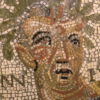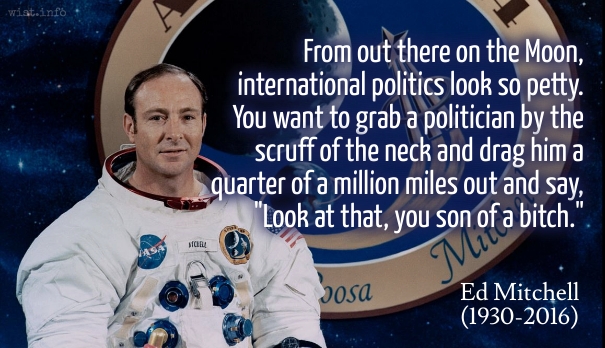It has been one of the defects of theologians at all times to over-estimate the importance of our planet. No doubt this was natural enough in the days before Copernicus when it was thought that the heavens revolve about the earth. But since Copernicus and still more since the modern exploration of distant regions, this pre-occupation with the earth has become rather parochial. If the universe had a Creator, it is hardly reasonable to suppose that He was specially interested in our little corner. And, if He was not, His values must have been different from ours, since in the immense majority of regions life is impossible.
Bertrand Russell (1872-1970) English mathematician and philosopher
“Is There a God?” (1952)
(Source)
Essay commissioned by Illustrated magazine in 1952, but never published there. First publication in Russell, Last Philosophical Testament, 1943-68 (1997) [ed. Slater/Köllner].
Quotations about:
earth
Note not all quotations have been tagged, so Search may find additional quotes on this topic.
Go, sit in the shade of the rose, for every rose
That springs from the earth, again to earth soon goes away!Omar Khayyám (1048-1123) Persian poet, mathematician, philosopher, astronomer [عمر خیام]
Rubáiyát [رباعیات], Bod. # 135, ll. 3-4 [tr. M. K. (1888)]
(Source)
Alternate translations:
And look -- a thousand Blossoms with the Day
Woke -- and a thousand scatter'd into Clay
[tr. FitzGerald, 1st ed. (1859), # 8]
Morning a thousand Roses brings, you say;
Yes, but where leaves the Rose of yesterday?
[tr. FitzGerald, 2nd Ed (1868), # 9]
Each Morn a thousand Roses brings, you say:
Yes, but where leaves the Rose of Yesterday?
[tr. FitzGerald, 3rd ed. (1872), # 9; same in later editions]
Sit in the shade of the rose, for many times this rose from earth has come, and unto earth has gone.
[tr. McCarthy (1879), # 463]
Sit we beneath this rose, which many a time
Has sunk to earth, and sprung from earth again.
[tr. Whinfield (1883), # 414]
Sit in the shade of the rose, for, by the wind, many roses
have been scattered to earth and have become dust.
[tr. Heron-Allen (1898), # 135]
Sit we 'neath this rose shade, for many a rose
Wind strewn in earth has turned to earth again!
[tr. Thompson (1906), # 522]
Sit in her fragrant bower, for oft the wind
Hath strewn and turn'd to dust such flowers as these.
[tr. Talbot (1908), # 135]
Rest in the shadow of the rose, for many of its leaves will the rose
Shed on the earth while we lie under the earth.
[tr. Rosen (1928), # 270]
Stay, Dearest One! beneath the rosy shade,
The roses bloom for Thee but soon would blight.
[tr. Tirtha (1941), # 3.7]
Sit in the rose's shadow, for oftentimes this rose shall spill upon the dust, when we are dust.
[tr. Bowen (1976), # 5a]
The Rosetree spills her petals in the dust,
And nothing of her fragrant harvest saves;
And yet this Rose, a plaything of the breeze,
Will bloom each year when we are in our graves.
[tr. Bowen (1976), # 5b]
Child, your first birthday presents will come from nature’s wild —
Small presents: earth will shower you with romping ivy, foxgloves,
Bouquets of gipsy lilies and sweetly-smiling acanthus.[At tibi prima, puer, nullo munuscula cultu
errantis hederas passim cum baccare tellus
20mixtaque ridenti colocasia fundet acantho.]Virgil (70-19 BC) Roman poet [b. Publius Vergilius Maro; also Vergil]
Eclogues [Eclogae, Bucolics, Pastorals], No. 4 “Pollio,” l. 18ff (4.18-20) (42-38 BC) [tr. Day Lewis (1963)]
(Source)
Celebrating the birth of Saloninus, a boy born in the consulship of his father and Virgil's patron C. Asinius Pollio. Or, possibly, writing of Marcellus, son of Augustus. Or maybe just a lot of veiled references to Augustus himself. Or, say some, divine prophecy of the future Jesus Christ. Lots of theories; some summaries here and here.
(Source (Latin)). Alternate translations:
Which shall to thee (sweet childe) undrest, bring forth,
Berries, wilde Ivie, and shall pay first fruits
Of mixt Acanthus, with Egyptian roots.
[tr. Ogilby (1649)]
Unbidden Earth shall wreathing Ivy bring,
And fragrant Herbs (the promises of Spring)
As her first Off'rings to her Infant King.
[tr. Dryden (1709), l. 22ff]
Gladly to thee its natal gifts the field,
Till'd by no human hand, bright Boy, shall yield;
The baccar's stem with curling ivy twine.
And colocasia and acanthus join.
[tr. Wrangham (1830)]
Meanwhile the earth, O boy, as her first offerings, shall pour thee forth every where, without culture, creeping ivy with lady's glove, and Egyptian beans with smiling acanthus intermixed.
[tr. Davidson (1854)]
On thee, child, everywhere shall earth, untilled,
Show'r, her first baby-offerings, vagrant stems
Of ivy, foxglove, and gay briar, and bean.
[tr. Calverley (c. 1871)]
Yes, for you, sweet boy, shall the earth untilled pour forth far and wide a child's simple gifts, the creeping ivy twined with foxglove, and Egyptian beans blended with the bright smile of acanthus.
[tr. Wilkins (1873)]
To deck thy cradle earth spontaneous pours
The spikenard's perfume and the wealth of flowers,
Green ivy creeps around with graceful thread,
And bright acanthus smiles upon the bed.
[tr. King (1882), l. 282ff]
Now, fairest boy, will the new-teeming earth
No culture wait, but pour to make thee mirth,
As toys of off'ring she can soonest bear,
Wild nard and errant ivy everywhere,
And with th' Egyptian lily twined in play,
Laughing acanthus.
[tr. Palmer (1883)]
For thee, O boy,
first shall the earth, untilled, pour freely forth
her childish gifts, the gadding ivy-spray
with foxglove and Egyptian bean-flower mixed,
and laughing-eyed acanthus.
[tr. Greenough (1895)]
Meanwhile the earth, O boy, as her first offerings, shall pour forth for you everywhere, without culture, creeping ivy with lady’s glove, and Egyptian beans with smiling acanthus intermixed.
[tr. Bryce (1897)]
But on thee, O boy, untilled shall Earth first pour childish gifts, wandering ivy-tendrils and foxglove, and colocasia mingled with the laughing acanthus.
[tr. Mackail (1899)]
To him shall bring
Uncultured earth her first small offerings,
Creeping wild ivy, arums, foxgloves too,
Smiling acanthus with bright polished leaf.
[tr. Mackail/Cardew, verse (1908)]
For tributes at thy birth, O blessed babe.
The untilled earth with wandering ivies wild
Shall mingle spikenard, and from bounteous breast
Pour forth her lilies and Egyptian balm.
[tr. Williams (1915)]
But for you, child, the earth untilled will pour forth its first pretty gifts, gadding ivy with foxglove everywhere, and the Egyptian bean blended with the laughing briar; unbidden it will pour forth for you a cradle of smiling flowers.
[tr. Fairclough (Loeb) (1916)]
Free-roaming ivy, foxgloves in every dell, and smiling acanthus mingled with Egyptian lilies — these, little one, are the first modest gifts that earth, unprompted by the hoe, will lavish on you.
[tr. Rieu (1949)]
But these, dear boy, are the first pretty gifts in plenty
Our Earth from effortless fields shall bring you: ivy
With foxglove wandering hither and thither, commingled
With lotus and laughing-eyed acanthus.
[tr. Johnson (1960)]
Dear child, there will be new little gifts for you,
Springtime valerian, and trailing ivy,
Egyptian beans, and smiling acanthus, all
poured out profusely from the untilled earth.
[tr. Ferry (1999)]
And for you, boy, the uncultivated earth will pour out
her first little gifts, straggling ivy and cyclamen everywhere
and the bean flower with the smiling acanthus.
[tr. Kline (2001)]
And for you, little boy, the uncultivated earth will scatter its first small gifts, wandering ivy and cyclamens everywhere, beans mixed with laughing acanthus.
[tr. @sentantiq (2015)]
The longer I live, the more I am inclined to the belief that this earth is used by other planets as a lunatic asylum.
George Bernard Shaw (1856-1950) British playwright and critic
(Attributed)
Attributed to Shaw by Judge Henry Neil in a letter (6 Sep 1919) to the Dublin Weekly Freeman. Neil said Shaw had made the statement in correspondence over pension laws for widows. While Voltaire (and others earlier) employed similar metaphors for Earth as a madhouse, this particular phrasing appears to be Shaw's.
More discussion of the quotation's origins here: This Earth Is Used By Other Planets as a Lunatic Asylum – Quote Investigator.
The parallels between Easter Island and the whole modern world are chillingly obvious. Thanks to globalization, international trade, jet planes, and the Internet, all countries on Earth today share resources and affect each other, just as did Easter’s dozen clans. Polynesian Easter Island was as isolated in the Pacific Ocean as Earth is today in space. When the Easter Islanders got into difficulties, there was nowhere to which they could flee, nor to which they could turn for help, nor shall we modern Earthlings have recourse elsewhere if our troubles increase. Those are the reasons why people see the collapse of Easter Island society as a metaphor, a worst-case scenario, for what may lie ahead of us in our own future.
Jared Diamond (b. 1937) American geographer, historian, ornithologist, author
Collapse: How Societies Choose to Fail or Succeed, Part 2, ch. 2 (2005)
(Source)
This is the actual full text from Diamond's book. It is almost universally paraphrased (including the bracketed inclusion) as:
The metaphor is so obvious. Easter Island isolated in the Pacific Ocean -- once the island got into trouble, there was no way they could get free. There was no other people from whom they could get help. In the same way that we on Planet Earth, if we ruin our own [world], we won't be able to get help.
I speculate that this pared-down phrasing was used by Diamond during a speech or seminar about the subject, or an interview about the book, and was then mistakenly identified (and copied) as a quote from the book. For example, at the ASA, CSSA, and SSSA Annual Meetings, Long Beach, California (2010), for example, Diamond is quoted with this near match:
The metaphor is so obvious. Easter Island is isolated in the Pacific Ocean; once the Easter Islanders got into trouble, there was nowhere that they could flee. Just as if, today, we on planet Earth mess up our island planet, there is no other galaxy that we’re going to be able to float off to.
To suppose that God Almighty has confined his goodness to this world, to the exclusion of all others, is much similar to the idle fancies of some individuals in this world, that they, and those of their communion or faith, are the favorites of heaven exclusively; but these are narrow and bigoted conceptions, which are degrading to a rational nature, and utterly unworthy of God, of whom we should form the most exalted ideas.
Ethan Allen (1738-1789) American businessman, land speculator, revolutionary, writer
Reason, the Only Oracle of Man, ch. 2 sec. 7 (1782)
(Source)
And earth who herself bestowed the body takes it back and wastes not a whit.
[Terram corpus quae dederit, ipsam capere neque dispendi facere hilum.]
Ennius (239-169 BC) Roman poet, writer [Quintus Ennius]
Fragment from the Annales Book 1, frag. 11-12 [tr. Warmingham (1935)]
(Source)
In Varro, De Lingua Latina, Book 5, sec 60, ll. 4-5 (1st C BC). In some locations, the Latin is given as "terraque corpus quae dedit ipsa capit neque dispendi facit hilum."
Alternate translations:
The body she's given Earth does herself take back, and of loss not a whit does she suffer.
[tr. Kent (1938)]
Earth herself takes back the body which she gave, and permits no loss whatsoever.
[Source (2013)]
Now down in the Ocean sank the fiery light of day,
drawing the dark night across the grain-giving earth.[Ἐν δ’ ἔπεσ’ Ὠκεανῷ λαμπρὸν φάος ἠελίοιο
ἕλκον νύκτα μέλαιναν ἐπὶ ζείδωρον ἄρουραν.]Homer (fl. 7th-8th C. BC) Greek author
The Iliad [Ἰλιάς], Book 8, l. 485ff (8.485-486) (c. 750 BC) [tr. Fagles (1990)]
(Source (Greek)). Alternate translations:
And now Sol’s glorious light
Fell to the sea, and to the land drew up the drowsy night.
[tr. Chapman (1611), ll. 426-27]
Now deep in ocean sunk the lamp of light,
And drew behind the cloudy veil of night.
[tr. Pope (1715-20)]
And now the radiant Sun in Ocean sank,
Drawing night after him o’er all the earth.
[tr. Cowper (1791)]
And the bright light of the sun fell into the ocean, drawing dark night over the fruitful earth.
[tr. Buckley (1860)]
The sun, now sunk beneath the ocean wave,
Drew o’er the teeming earth the veil of night.
[tr. Derby (1864)]
And the sul’s bright light dropped into Ocean, drawing black night across Earth the grain-giver.
[tr. Leaf/Lang/Myers (1891)]
The sun's glorious orb now sank into Oceanus and drew down night over the land.
[tr. Butler (1898)]
Then into Oceanus fell the bright light of the sun
drawing black night over the face of the earth, the giver of grain.
[tr. Murray (1924)]
And now the shining light of the sun was dipped in the Ocean trailing black night across the grain-giving land.
[tr. Lattimore (1951)]
Now in the western Ocean the shining sun dipped,
drawing dark night on over the kind grainbearing earth.
[tr. Fitzgerald (1974)]
Helios' radiant sunlight then fell into the Ocean,
drawing the black night over the grain-giving land.
[tr. Merrill (2007)]
Fools! who fancy Christ mistaken;
Man a tool to buy and sell;
Earth a failure, God-forsaken,
Ante-room of Hell.Charles Kingsley (1819-1875) English clergyman, historian, essayist, novelist (pseud. "Parson Lot")
“The World’s Age” (1849)
(Source)
You develop an instant global consciousness, a people orientation, an intense dissatisfaction with the state of the world, and a compulsion to do something about it. From out there on the Moon, international politics look so petty. You want to grab a politician by the scruff of the neck and drag him a quarter of a million miles out and say, “Look at that, you son of a bitch.”
Edgar "Ed" Mitchell (1930-2016) American aviator, engineer, astronaut
(Attributed)
The earliest source I can find of the quote is in People (8 Apr 1974), where it appears as an epigraph for a story on Mitchell three years after his flight to the Moon.
All things pass in time. We are far less significant than we imagine ourselves to be. All that we are, all that we have wrought, is but a shadow, no matter how durable it may seem. One day, when the last man has breathed his last breath, the sun will shine, the mountains will stand, the rain will fall, the streams will whisper — and they will not miss him.














